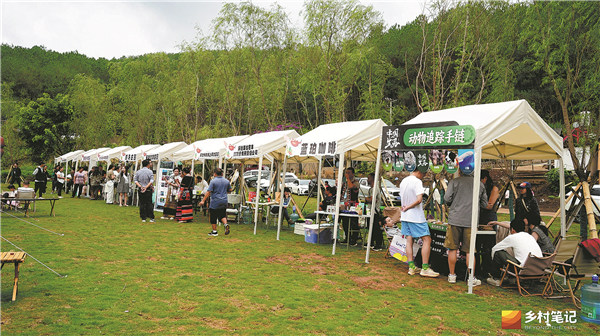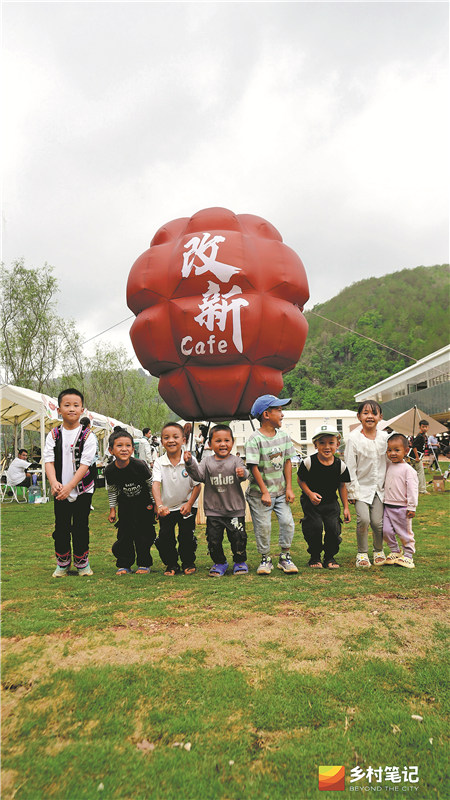The coffee-themed park draws many guests from across the country to Gaixin village, Lancang Lahu autonomous county, Pu'er, Southwest China's Yunnan province. [Photo / China Daily]
Support from urban authorities brings positive change with new projects directed at younger generation, Yang Feiyue and Li Yingqing report.
Wei Xiaolin was too excited to sleep as she had been preparing for the opening of a coffee-themed park in her hometown on May 18.
She got up very early and put on her barista uniform to serve various coffee drinks to more than 80 guests from across the country at the park in Gaixin village, Lancang Lahu autonomous county, Pu'er, Southwest China's Yunnan province.
The 20-year-old was full of vigor and couldn't help but smile at each of her guests.
"I have to do my part right because they are here to help my hometown in its development, "says Wei, who was born in the county.
She was thrilled to hear in March that a coffee-themed getaway was coming to her hometown when she was looking for internships as a senior student at the Yunnan Technician College in the provincial capital Kunming.
"I figured it was a great opportunity to work near my home, "she says.
Two months ago, she didn't know much about coffee and now she not only appreciates the different coffee beans but can make coffee drinks.
Wei says she's excited that the park's manager told her she is welcome to keep working at the park after graduation.
At the park, visitors can experience the whole process of coffee making, such as growing coffee beans, processing them and turning them into drinks.
Gaixin used to be a very ordinary village where the residents relied on traditional farming and husbandry.
Since 2023, the village has carried out a coffee seed-to-cup industrial chain and implemented a series of farming culture and tourism projects.
A coffee production factory has risen from an empty lot and coffee plantations have taken shape.
The village's idle collective assets have been repurposed and given rise to a 1, 000-square-meter coffee training and experience center, as well as a fun learning base for students to explore the countryside.
Tong Meifang, a local villager, has witnessed the positive changes firsthand.
"A sewage treatment system has been installed and fellow villagers have dismantled abandoned cattle pens, transforming the areas in front of and behind their houses into small vegetable or flower gardens, "says the woman in her 30s.
"Our village is so beautiful now, it's like living in a garden, so we must cherish it, "Tong says.
The project has brought positive changes to the village. It is part of the supportive initiative between Shanghai's Huangpu district with Lancang that started in 1996.
It was a result of the nation's East-West collaboration put forward by the central government in the 1990s that was aimed at reducing regional disparities and promoting balanced economic development across the country. This policy framework encourages cooperation between the more economically developed eastern regions and the less developed western regions.
Over the years, Huangpu has taken positive measures in rural development, health and hygiene, and industrial and social welfare to help boost Lancang's development.
Yu Xuchen is an official sent from Huangpu to aid Lancang in July 2022. Upon arriving, he spent three months visiting more than 20 villages and townships in the county with Piao Su, the rural vitalization bureau's deputy head.
It led to the finding that Lancang has 70, 000 mu(4, 667 hectares)of coffee plantations, making coffee a pillar industry for the county. However, the county didn't have a single advanced coffee processing plant.
"All the coffee beans in Lancang were purchased as raw materials by buyers from outside the region. Shanghai is one of the largest coffee consumption markets in the world, so we found a way to create a direct connection, "says Yu, who is now deputy head of the county.
A culture and coffee fair is staged at the park during its opening in May. [Photo / China Daily]
Yu and Piao then reached out to Cai Zhongshun, chair of the Shanghai-based MQ Coffee, one of the leading brands nationwide.
The two took Cai on an inspection tour of the coffee production areas in Lancang and eventually settled on Gaixin, which is about a 15-minute drive from Lancang Jingmai Airport.
It sits 1, 500 meters above sea level and has more than 130 hectares of coffee plantations, making it an ideal place for growing high-quality coffee, Cai observes.
Cai says he hopes to promote coffee cultivation in the surrounding areas.
Currently, the factory in Gaixin can produce 3, 000 metric tons of coffee annually, with the potential to achieve an annual production of 10, 000 tons in the future.
His company will manage soil conditions, fertilization, harvesting and processing of coffee beans to upgrade the product quality, Cai says.
"The company not only has technology and educational training resources but also connects to the international market, "Yu says.
"After the company established operations in Lancang, the county gained its first advanced coffee processing production line. This not only provides residents with nearby employment opportunities but also promotes the cultivation of premium coffee and helps Lancang train coffee talent, "he adds.
Once MQ Coffee settled in the village, Yu began to contemplate how to improve the village's appearance and infrastructure and mobilize the villagers to get involved and increase their incomes.
He believes farmers are the mainstay of rural vitalization and have to be part of the concerted force along with the efforts of the government and market.
Yu then reached out to Wang Xingyu, who he went to college with, and has been striving to integrate education with rural experiences since 2017. Wang managed to bring thousands of urban students to villages across the country.
Wang visited Gaixin for the first time in 2022 when he and Yu brainstormed about the village's future development and reached a consensus of attracting more young people to work there.
In Wang's opinion, the coffee park can serve as a community for urban and rural youths to work together.
He intends for the park to offer young people support in information, resources, models and space that are necessary for their entrepreneurial causes. "Identifying a real rural issue and finding a group of urban and rural youth to solve it together might be a new model for rural vitalization, "Wang says.
He will work with local authorities to launch the Village Governance Officer Project in Gaixin and find urban and rural youth who are keen to participate in rural vitalization.
"They will come to the village to work on environmental governance, educational empowerment and cultural heritage practices. We hope this model can be promoted to more villages, "Wang says.
Children play and pose for picture at the park. [Photo provided to China Daily]
Yu says Wang has brought many young people and students to study in the village and he was surprised to learn many of them were satisfied with the arrangement, despite the underdeveloped accommodation conditions back then.
It reinforced Yu's conviction about the village's potential.
Tang Jianguang, founder of a Beijing-based photography and film learning institute for young people, was among the guests invited to the opening of the park.
It was his second visit to the village and he says he was impressed by the big changes in the village's infrastructure and the villagers'excitement.
"They wore traditional costumes, took the initiative to communicate with us, took us on a tour of the village, and invited us to have meals in their homes. They were very proud, "Tang says.
Tang plans to bring urban children to experience the geographical and cultural elements of the village and have local children participate in filming and recording their beautiful homes.
"This can help them rediscover the endowments of the village and thus be more willing to stay when they grow up, "Tang says.
Looking back, Yu says it has not been an easy ride, as many problems have emerged in the process of establishing the coffee park.
Now that the park is up and running, Yu is full of hope and waiting for the best yet to come.
He says he is looking forward to the coffee plant going into full operation next year, which will offer more employment to the residents.
He is also counting on Wang's team to continuously bring young people from outside to the village, bringing along with them new ideas and concepts.
"I hope that the young people who left home for work in bigger cities can come back and participate in the rural vitalization of their hometown, "Yu says. "I also wish that Gaixin will become an inspiring example for urban-rural collaboration. "


